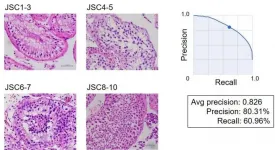(Press-News.org) DALLAS, May 10, 2021 — Managing weight, blood pressure and cholesterol in children may help protect brain function in later life, according to new research published today in the American Heart Association’s flagship journal Circulation. This is the first study to highlight that cardiovascular risk factors accumulated from childhood through mid-life may influence poor cognitive performance at midlife.
Previous research has indicated that nearly 1 in 5 people older than 60 have at least mild loss of brain function. Cognitive deficits are known to be linked with cardiovascular risk factors, such as high blood pressure, obesity, type 2 diabetes, smoking, physical inactivity and poor diet, as well as depression and low education level.
Many diseases that cause neurological deficits, such as Alzheimer’s, have a long preclinical phase before noticeable symptoms begin, so finding links between childhood obesity and other cardiovascular risk factors is important for cognitive health. The researchers noted that there are currently no cures for major causes of dementia, so it is important to learn how early in life cardiovascular risk factors may affect the brain.
“We can use these results to turn the focus of brain health from old age and midlife to people in younger age groups,” said the study’s first author Juuso O. Hakala, M.D., a Ph.D. student at the Research Centre of Applied and Prevention Cardiovascular Medicine at the University of Turku, in Turku, Finland. ”Our results show active monitoring and prevention of heart disease and stroke risk factors, beginning from early childhood, can also matter greatly when it comes to brain health. Children who have adverse cardiovascular risk factors might benefit from early intervention and lifestyle modifications.”
The Cardiovascular Risk in Young Finns Study is a national, longitudinal study on cardiovascular risk from childhood to adulthood in Finland. Researchers followed the participants’ cardiovascular risk factor profiles for 31 years from childhood to adulthood. Baseline clinical examinations were conducted in 1980 on approximately 3,600 randomly selected boys and girls, ranging in ages from 3 to 18, all of whom were white. More than 2,000 of the participants, ranging in ages from 34 to 49, underwent a computerized cognitive function test in 2011. The test measured four different cognitive domains: episodic memory and associative learning; short-term working memory; reaction and movement time; and visual processing and sustained attention.
Researchers found:
Systolic blood pressure, total blood cholesterol and low-density lipoprotein (LDL) cholesterol, as well as body mass index, from childhood to midlife are associated with brain function in middle age.
Consistently high systolic blood pressure or high blood total cholesterol and LDL cholesterol were linked to worse memory and learning by midlife when compared with lower measures.
Obesity from childhood to adulthood was associated with lower visual information processing speed and maintaining attention.
Having all three cardiovascular risk factors was linked to poorer memory and associative learning, worse visual processing, decreased attention span, and slower reaction and movement time.
These results are from observational findings, so more studies are needed to learn whether there are specific ages in childhood and/or adolescence when cardiovascular risk factors are particularly important to brain health in adulthood. Study limitations include that a definite cause-and-effect link between cardiovascular risk factors and cognitive performance cannot be determined in this type of population-based study; cognition was measured at a single point in time; and because all study participants are white, the results may not be generalizable to people from other racial or ethnic groups.
In 2020, the American Heart Association partnered with Nemours, a nonprofit pediatric health system, to create Healthy Way to Grow – a national, science-based, early childhood technical assistance program to help improve practices and policies to prevent childhood obesity.
INFORMATION:
Co-authors are Katja Pahkala, Ph.D.; Markus Juonala, M.D., Ph.D.; Pia Salo, M.D., Ph.D.; Mika Kähönen, M.D., Ph.D.; Nina Hutri-Kähönen, M.D., Ph.D.; Terho Lehtimäki; M.D., Ph.D.; Tomi P. Laitinen, M.D., Ph.D.; Eero Jokinen, M.D., Ph.D.; Leena Taittonen, M.D., Ph.D.; Päivi Tossavainen, M.D., Ph.D.; Jorma S.A. Viikari, M.D., Ph.D.; Olli T. Raitakari, M.D., Ph.D.; and Suvi P. Rovio, Ph.D. The authors reported no disclosures.
Funding sources are detailed in the manuscript.
Additional Resources:
Available multimedia is on right column of release link - https://newsroom.heart.org/news/managing-childrens-weight-blood-pressure-cholesterol-protects-brain-function-mid-life?preview=5a3ae5244bf9587213f6911b5b377fb6
After May 10, view the manuscript online.
High blood pressure at any age, no matter how long you have it, may speed cognitive decline
Physical Activity Keeps your Brain Sharp
Obesity, other factors may speed up brain aging
Lowering blood pressure may prevent new brain lesions in older people
Gaining a little weight after quitting tobacco is offset by the benefits for people with diabetes; smoking long term is associated with cognitive decline
Brain Health
Healthy Way to Grow recognizes excellence in obesity prevention for young children
Follow AHA/ASA news on Twitter @HeartNews
Follow news from the AHA’s flagship journal Circulation @CircAHA
Statements and conclusions of studies published in the American Heart Association’s scientific journals are solely those of the study authors and do not necessarily reflect the Association’s policy or position. The Association makes no representation or guarantee as to their accuracy or reliability. The Association receives funding primarily from individuals; foundations and corporations (including pharmaceutical, device manufacturers and other companies) also make donations and fund specific Association programs and events. The Association has strict policies to prevent these relationships from influencing the science content. Revenues from pharmaceutical and biotech companies, device manufacturers and health insurance providers are available here, and the Association’s overall financial information is available here.
About the American Heart Association
The American Heart Association is a relentless force for a world of longer, healthier lives. We are dedicated to ensuring equitable health in all communities. Through collaboration with numerous organizations, and powered by millions of volunteers, we fund innovative research, advocate for the public's health and share lifesaving resources. The Dallas-based organization has been a leading source of health information for nearly a century. Connect with us on heart.org, Facebook, Twitter or by calling 1-800-AHA-USA1.
DALLAS, May 10, 2021 — In a small study, researchers found college athletes who contracted COVID-19 rarely had cardiac complications. Most had mild COVID symptoms that did not require treatment, and in a small percentage of those with abnormal cardiac testing, there was no evidence of heart damage on special imaging tests. All athletes returned to sports without any health concerns, according to new research published today in the American Heart Association’s flagship journal Circulation.
In spring 2020, concerns about heart damage, especially inflammation, among athletes with COVID-19 led to recommendations for cardiac screening based on symptom severity before resuming training and competition. The preferred diagnostic test for heart inflammation is an MRI of the heart, ...
Low levels of serotonin in the brain are seen as a possible cause of depression and many antidepressants act by blocking a protein that transports serotonin away from the nerve cells. A brain imaging study at Karolinska Institutet now shows that the average level of the serotonin transporter increased in a group of 17 individuals who recovered from depression after cognitive behavioural therapy. The results are published in the journal Translational Psychiatry.
"Our results suggest that changes to the serotonin system are part of the biology of depression and that this change is related to the episode rather than a static feature - a state rather than a trait," says the study's last author Johan Lundberg, researcher at the Department of Clinical Neuroscience, ...
What has fluid physics to do with the spreading of the Corona virus? Whirlpools and pandemics seem to be rather different things, certainly in terms of comfort. Yet, newest findings about epidemic spreading come from Physics professor Björn Hof and his research group at the Institute of Science and Technology Austria (IST Austria), who specialize in fluids and turbulent flows. When early last year Björn Hof had to cancel his scheduled visit to Wuhan, his wife's hometown, his focus abruptly shifted to epidemic spreading.
"My group normally investigates turbulent flows in pipes and channels", he explains, "Over the last 10 years we have shown that the onset of turbulence is described ...
Infertility affects females and males equally. In male infertility, azoospermia (a medical condition with no sperm in semen) is a major problem that prevents a couple from having a child. For the treatment of patients with azoospermia, testicular sperm extraction (TESE) is required to obtain mature sperms. When examined, histological specimens are typically given a score, called the Johnsen score, on a scale of 1 to 10, based on the histopathological features of the testis.
"The Johnsen score has been widely used in urology since it was first reported 50 ...
Researchers at Linköping University, Sweden, have made several discoveries on the functioning mechanisms of the inner hair cells of the ear, which convert sounds into nerve signals that are processed in the brain. The results, presented in the scientific journal Nature Communications, challenge the current picture of the anatomical organisation and workings of the hearing organ, which has prevailed for decades. A deeper understanding of how the hair cells are stimulated by sound is important for such matters as the optimisation of hearing aids and cochlear implants for people with hearing loss.
In ...
In 1884, Edwin Abbott wrote the novel Flatland: A Romance in Many Dimensions as a satire of Victorian hierarchy. He imagined a world that existed only in two dimensions, where the beings are 2D geometric figures. The physics of such a world is somewhat akin to that of modern 2D materials, such as graphene and transition metal dichalcogenides, which include tungsten disulfide (WS2), tungsten diselenide (WSe2), molybdenum disulfide (MoS2) and molybdenum diselenide (MoSe2).
Modern 2D materials consist of single-atom layers, where electrons can move ...
UK landowners and conservationists welcome wider-spread use of Gene Conservation Units (GCUs) to help protect some of the rarest plants and insects, research at the University of York has shown.
In particular the Great Yellow Bumblebee and the Mountain Ringlet Butterfly, which are at risk of further population decline, would benefit from Gene Conservation Units, currently only employed for forest trees and agricultural species or their relatives.
Genetic diversity in these species is essential if they are to adapt to new, and often challenging, environmental conditions. Gene Conservation Units are areas of land managed to allow the recovery of species, and maintain evolutionary processes to enable them to adapt to environmental change.
For tree species, ...
FRANKFURT. When the SARS-CoV-2 virus mutates, this initially only means that there is a change in its genetic blueprint. The mutation may lead, for example, to an amino acid being exchanged at a particular site in a viral protein. In order to quickly assess the effect of this change, a three-dimensional image of the viral protein is extremely helpful. This is because it shows whether the switch in amino acid has consequences for the function of the protein - or for the interaction with a potential drug or antibody.
Researchers at Goethe University Frankfurt and TU Darmstadt began networking internationally from the very start of the pandemic. Their goal: to describe the three-dimensional structures ...
Thousands of sharks have been illegally caught in a Marine Protected Area (MPA) in the Indian Ocean, new research shows.
The MPA was created in 2010 around the Chagos Archipelago, also known as the British Indian Ocean Territory (BIOT), banning all fishing there.
The new study examined information on illegal fishing in the MPA - a vast (640,000 km²/250,000 mi2) area containing pristine and remote reefs.
Enforcement data suggests more than 14,000 sharks were caught in the MPA from 2010-20, but discussions with fishers in the region suggest the true number was "considerably ...
BEER-SHEVA, Israel May 10, 2021 - Researchers from Ben-Gurion University (BGU), together with American and German colleagues, have developed new "molecular tweezers" to combat antibiotic-resistant bacteria. Their recently announced findings were published in Cell Chemical Biology.
For years, medical professionals have struggled with bacterial infections becoming increasingly resistant to antibiotics. These molecular tweezers may be the key to battling one of greatest public health issues of the 21st century.
"Our discovery prevents infection without building up antibiotic resistance, and it might even be preferable to develop treatments based on molecular tweezers rather than antibiotics," said BGU Department of Chemistry Prof. Raz Jelinek.
The research team, led ...








